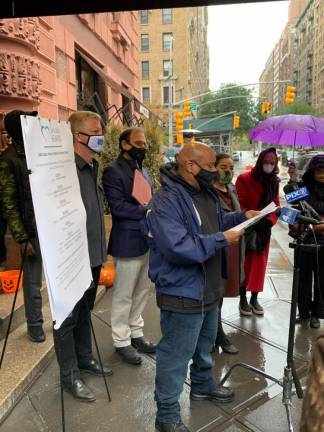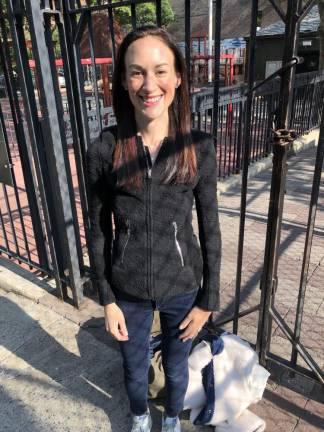Each side has found residents of the Lucerne shelter who would urgently like to stay, or leave.
Each side says the other side is a minority voice in the neighborhood.
Each side says the other is motivated by its politics or privilege.
What neither side has done is talk to the other.
Instead, the Upper West Side’s divide over whether the Lucerne Hotel should continue to shelter some 240 men without homes has ended up before a judge, Justice Debra James of Manhattan Supreme Court.
By far the most complete conversation about this dispute is now found in the legal submissions, although as with most court cases the material seems more designed to support an argument not seek out a solution.
“I cannot believe my good fortune at obtaining a room at the Lucerne,” Ramone Buford, 51, testified in an affidavit arguing he and other residents should be allowed to remain there. “I have used, and continue to use, the Lucerne Programs on a daily basis. And they have changed my life. I am no longer alcohol dependent. I have begun to meet with civic leaders and have been invited to give talks to children at venues in the neighborhood. After decades of struggling with substance use disorder and mental illness, and living on the streets, or in and out of shelters, I am finally on a path towards a normal life.”
But Lou Pastures, 55, another resident, painted a contradictory picture in his affidavit:
“Life at the Lucerne is difficult. There are house rules, but they are rarely enforced. For example, there is frequent fighting in the hallways, but nothing is done about it. Smoking is officially prohibited, but smoke is thick throughout the building and the staff only disciplines residents if they are seen with drugs or cigarettes in hand. Masks are required, but I rarely see any staff or residents wearing them. The housing office is very small and does not allow residents to socially distance from the housing director. Drug use is rampant throughout the Lucerne. There are drug overdoses many days at the Lucerne, and I am aware of two deaths at the Lucerne since my arrival, both of which I understand were from heroin overdoses.”
Pastures reported that Buford and two other men who submitted affidavits asking to stay were among “the lucky few” who were given single rooms at the Lucerne.
“I, like most of us, have a roommate,” Pasture added. “Being doubled up in a single room does not provide a lot of opportunity for social distancing, and I fear contracting COVID due to my living arrangement. I understand that the new facility to which we are to be moved — 52 William St., that I understand is being converted into a permanent shelter — has sufficient space for Lucerne residents to have single rooms there.”
Threat to Sue
This case developed in pieces. The men were moved into the Lucerne, on West 79th St. and Amsterdam Avenue, on July 27 as part of the city’s program to protect those without a better place to live from the pandemic.
After protests from the neighborhood, and a threat to sue by Randy Mastro, representing the newly formed West Side Community Organization, Mayor Bill de Blasio agreed to move the men to the former Radisson hotel at 52 William St. in the financial district.
FiDi residents objected, but Justice James rejected their claims.
At that point Buford and two of his fellow residents at the Lucerne, supported by the Upper West Side Open Hearts Initiative, another new group created to counter neighborhood resistance, asked James to block the move from the Lucerne. “The Forced Relocation would threaten us with irreparable harm, resulting in tragic consequences to me, Larry, Travis and our fellow residents at the Lucerne,” Buford wrote.
The judge issued an order to temporarily restrain the move pending a fuller hearing, now scheduled for November 16.
Pasture and the West Side Community Organization then filed their arguments in favor of the move out of the Lucerne.
Political Sniping
The legal briefs contain a high level of political sniping. “Other than the wealthy few who engaged a lobbyist to force our ouster, the Upper West Side community welcomes our presence and has embraced our advances,” Buford said in his affidavit.
“Upper West Side Open Hearts Initiative (“Open Hearts”), has commenced a hateful PR-campaign that appears obsessed with painting WestCo, our members, and our attorney (Randy Mastro) as ‘NIMBYs’ (not in my backyard) and ‘racists’,” Dr. Megan Martin, the leader of West Side Community Organization, responded in her affidavit to the court.
“But Open Hearts is wrong to say such things. They have no factual basis, and they have no place in this important debate about serious issues involving homeless housing. “
Martin pointed out to the court that the co-founder of Open Hearts, Professor Corrine Low, had written that the legal fees spent by West Co could be better used helping “shelter residents, rather than going to Randy’s yacht fund.” Martin wrote that she understood “that Randy Mastro has never had a yacht.”
“The malicious attacks on our organization and attorney did not stop at ill- informed tweets and inflammatory name-calling,” she noted. “Just 36 hours or so after this Court granted ProposedIntervenors/Petitioners’ application for a temporary restraining order, the family home of WestCo’s attorney, Randy Mastro, was vandalized with profanity-laden graffiti and red spray paint targeting at his advocacy to relocate homeless individuals from the Lucerne to a proper shelter facility.”
There was apparently one effort months ago to establish communication between Open Hearts Initiative and WestCo. But after a phone call, the two sides could not agree on ground rules for any further conversations.
In early October Open Hearts sent a letter to WestCo inviting them to “join our work.” But WestCo did not take up the invitation because members felt “there was a very clear condition” that the group drop its fight to end use of the Lucerne as a shelter. They might have accepted a proposal for a dialogue with no preconditions, one member said.
City Races
The conflict over the Lucerne has attracted the attention of many political candidates in next year’s city and borough-wide races, virtually all of them echoing the views, and sometimes the language, of the Open Hearts Initiative.
Shaun Donovan, a candidate for mayor and former Secretary of Housing and Urban Development, visited an Open Hearts event Sunday in which men at the Lucerne could “shop” for free clothing and supplies.
In announcing Donovan’s visit, a spokesperson for Open Hearts Initiative, Becky Stern, issued an advisory which said: “Bill de Blasio caved to a group of Upper West Siders who started a racist Facebook group and raised $150,000 to hire top litigator Randy Mastro to kick Project Renewal shelter residents out of the Lucerne. The Mayor’s decision to move the shelter has emboldened NIMBYs across New York City to privately fundraise ever-growing sums to keep shelters out of their neighborhoods.”
Six out of ten New Yorkers (62%) support housing homeless New Yorkers in shelters or hotels in their neighborhoods, according to a poll conducted online last month by Ipsos for Spectrum News. Almost the same number (58%), said they feel less safe in their neighborhood compared to a year ago.
A majority in New York City residents disapprove of the job de Blasio is doing on homelessness (55%), according to the survey.
The judge issued an order to temporarily restrain the move pending a fuller hearing, now scheduled for November 16.

